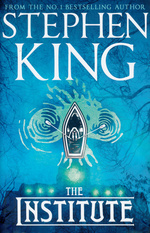
Institute, The (HC) (King, Stephen)
In the middle of the night, in a house on a quiet street in suburban Minneapolis, intruders silently murder Luke Ellis’s parents and load him into a black SUV. The operation takes less than two minutes. Luke will wake up at The Institute, in a room that looks just like his own, except there’s no window. And outside his door are other doors, behind which are other kids with special talents—telekinesis and telepathy—who got to this place the same way Luke did: Kalisha, Nick, George, Iris, and ten-year-old Avery Dixon. They are all in Front Half. Others, Luke learns, graduated to Back Half, “like the roach motel,” Kalisha says. “You check in, but you don’t check out.” In this most sinister of institutions, the director, Mrs. Sigsby, and her staff are ruthlessly dedicated to extracting from these children the force of their extranormal gifts. There are no scruples here. If you go along, you get tokens for the vending machines. If you don’t, punishment is brutal. As each new victim disappears to Back Half, Luke becomes more and more desperate to get out and get help. But no one has ever escaped from the Institute. As psychically terrifying as Firestarter, and with the spectacular kid power of It, The Institute is Stephen King’s gut-wrenchingly dramatic story of good vs. evil in a world where the good guys don’t always win.
Udgivet af Hodder & Stoughton
Stephen King
Stephen Edwin King (born September 21, 1947) is an American author of contemporary horror and suspense fiction; he has also written sci-fi and fantasy novels. When King was two years old, his father, who was a merchant seaman, left the family under the pretense of "going to buy a pack of cigarettes," leaving his mother to raise King and his adopted older brother David by herself, sometimes under great financial strain.
As a child, King apparently witnessed one of his friends being struck and killed by a train, though he has no memory of the event. His family told him that after leaving home to play with the boy, King returned, speechless and seemingly in shock. Only later did the family learn of the friend's death. Some commentators have suggested that this event may have psychologically inspired some of King's darker works, but King himself has dismissed the idea.
King's primary inspiration for writing horror fiction was related in detail in his 1981 non-fiction Danse Macabre, in a chapter titled "An Annoying Autobiographical Pause". King makes a comparison of his uncle successfully dowsing for water using the bough of an apple branch with the sudden realization of what he wanted to do for a living. While browsing through an attic with his elder brother, King uncovered a paperback version of an H. P. Lovecraft collection of short stories that had belonged to his father. The cover art—an illustration of a monster hiding within the recesses of a hell-like cavern beneath a tombstone—was, he writes,
“the moment of my life when the dowsing rod suddenly went down hard ... as far as I was concerned, I was on my way.”
More than 350 million copies of King's novels and short story collections have been sold, and many of his stories have been adapted for film, television, and other media. King has written a number of books using the pen name Richard Bachman, and one short story, "The Fifth Quarter", as John Swithen. In 2003 the National Book Foundation awarded King the Medal for Distinguished Contribution to American Letters.
He and his wife own and occupy three different houses, one in Bangor, one in Center, Lovell, Maine, and they regularly winter in their waterfront mansion located off the Gulf of Mexico, in Sarasota, Florida. He and Tabitha have three children and three grandchildren.

